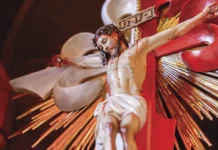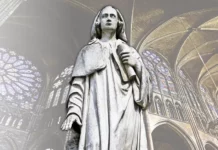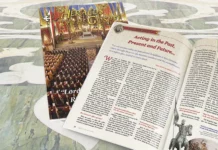“Hypocrites”, “blind guides”, “brood of vipers”! Who would like to receive such titles? They are the names given by the Divine Master to the bad shepherds of His time…
Why was Our Lord not a Pharisee? Had He chosen to follow this path, He would have occupied a position of honour in society. His influence would have enjoyed greater scope, disputes would have been avoided and, who knows, He might even have been officially recognized as the Messiah and the Crucifixion may never have taken place.
The Pharisees were viewed as the guardians of the true Religion, the only ones who practised the precepts of the Law of Moses to perfection, with all the developments and interpretations which they had supposedly received through oral tradition. In short, the institutional sphere of Judaism when Our Lord became incarnate was dominated by Pharisaism.
Nevertheless, He did not wish to fit the criteria of that party, however prestigious it might have been from a human perspective. Why?

The origins of Pharisaism
In the 4th century BC, Palestine came under Greek domination. Following this, Hebrew thought, art and customs underwent a process of Hellenization, at first without coercion. The Jewish people’s way of life changed and, little by little, the practice of the true Religion was abandoned. People no longer frequented the Temple, and a lax atmosphere – an attempt to reconcile the worship of the God of Israel with the worship of idols – took hold of the Holy City.
Step by step, tradition was abandoned in favour of a new way of being, purportedly more in tune with the intellectual and carnal needs of man: eating foods forbidden by the Law, enjoying the Sabbath without restrictions, worshipping the gods of neighbouring nations and relaxing the obligation to keep the Commandments; in short, forsaking the rigours of a faith that was not suited to the novelties of other civilizations.
With the rise of Antiochus IV, the desolation produced by the apostasy worsened appreciably for, as Holy Scripture recounts, there arose from among the Hebrews “lawless men” (1 Mc 1:11) whose declared aim was to lead many into error. In Jerusalem, the Holy City where only Yahweh could be worshipped, idols were introduced. The Jews “abandoned the holy covenant. They joined with the Gentiles and sold themselves to do evil” (1 Mc 1:15).
The moral state of the chosen nation deteriorated to the point that the office of high priest was fraudulently usurped by Jason, who, with his Hellenistic policy, induced several priests to neglect their duties.1 Thus the covenant made between the Lord and Israel was abandoned, from the lowest ranks to the highest.
Several years passed in this tragic situation. Without leaders or worthy shepherds and stripped of its holy traditions, Religion was doomed to disappear. But the coming of the Messiah was approaching; it was less than two centuries away. Was God to take on flesh in a completely pagan world? How could this be prevented?
“Every one who is zealous for the Law”
“In those days arose Mattathias” (1 Mc 2:1). Faithful to the Law that God had given to his people, he could no longer tolerate its violation. So he rose up against Greek tyranny, summoning all those who wished to preserve the glory and honour of the Most High: “Let every one who is zealous for the Law and supports the Covenant come out with me!” (1 Mc 2:27). Thus began the epopee of the Maccabees.
Taking up weapons and assisted by the Most High, the army of Mattathias became more and more militant as their victories increased. At this stage “there united with them a company of Hasideans, mighty warriors of Israel, every one who offered himself willingly for the Law” (1 Mc 2:42).
Who were these men? They were a group of Jews, faithful to God and to their people’s tradition, who, from the third century BC, and more especially in later years, opposed the Hellenization of Israel. Although there are other conjectures, some believe that the Pharisees emerged from this group.2
At one time, they were good…
Gradually, the war of the Maccabees began to stray from its initial objectives – the purification of the Temple and the reconquest of religious freedom – and took on a markedly political character. In the view of many Hasideans, the uprising was going too far. It was then that they decided to separate, hence the word Pharisee, which probably has its etymological root in the Hebrew verb pārūš, separated.3

However, this movement – salutary in its beginnings – gradually turned fidelity to the Law into an obsession. Its members identified other initiates by the observation of a series of rules, gestures and signs; and those who did not practise them should be avoided by those of the group.4 In short, the separated ended up falling into the same deviations they had condemned in the Maccabees.
Countless details pertaining to the meticulous interpretation of the 613 rules carefully extracted from the Mosaic Law, of which 365 were negative precepts, did not seem easy to implement. Many of them might even sound ridiculous to contemporary ears: “do not pull your hair out for the dead,” “do not work with two different kinds of animals together,” “do not exceed the number of steps permitted on the Sabbath,” “do not eat bread made with grain from a new harvest,” “a king cannot own many horses,” “do not”, “do not” and three hundred more “do nots”, subdivided into many others depending on the master who interpreted them.
Who could possibly memorize them all? Could it be that the Pharisees themselves were faultless in the application of so many norms? In any case, the people held them as a kind of reference in terms of fidelity to the Law, and the course of events eventually made them the greatest religious authorities in Israel.5
Abuses in the religious sphere increased simply because there was no significant resistance to the Pharisaic impositions, often contrary to the true meaning of the Word of God and, above all, to the essence of its spirit, since they were based only on externals and forgot the purity of intention that should inspire them.
Years went by in this tragic state of affairs, and the Pharisees – who called themselves the defenders of the Law, but were in truth its detractors – were suffocating the people by preaching human truths, while forgetting the sole divine Truth. No one dared to denounce them… until the coming of the Messiah.
The divine denunciation
Loving in the extreme, Our Lord Jesus Christ took on flesh in order to draw all men to Himself. He “went about doing good” (Acts 10:38) to men… By healing the lame, multiplying loaves or giving sight to those who had never been able to see, He confirmed His almighty power and that He was the Expectation of Nations. However, those same lips that so often opened to say “Arise and walk,” “Your sins are forgiven,” “Go in peace, your faith has saved you,” were yet to declare other judgements.
“Woe to you, scribes and Pharisees, hypocrites!” To the propagators of error, the most sweet lips of the Saviour proffered recriminations, imprecations, and threats. The titles “teacher”, “master” or “guide”, so coveted by the Pharisees, were replaced by “blind guides”, “fools”, “serpents”, “brood of vipers” and, above all, “hypocrites” (cf. Mt 23:1-36; Mk 12:38-40; Lk 11:37-54).

And Our Lord did not stop there. He called them “sons of those who murdered the prophets,” and said that the innocent blood spilled, from Abel to the priest Zechariah, would fall on their heads. Now, Abel had been murdered long before the Hebrew people themselves came into being. How could they be responsible for this crime?
The Saviour seemed to be denouncing the existence of a mysterious genealogy – with which the Jews of that generation, especially the Pharisees, had a spiritual “consanguinity” – among all the wicked who had been plotting against the righteous throughout history.6 They were all one and the same family, in permanent and common collusion, with the objective of making war on God.
Have the Pharisees died out?
Although the Pharisees, as a party in the strict sense, had died out with the destruction of Jerusalem in 70 A.D. and the dispersion of the Chosen People, it does not seem unreasonable to conjecture that this spiritual offspring of the “murderers of the prophets” – which dates back to the origin of the human race and, therefore, is not limited to one nation – continued its trajectory over the course of time, as, in fact, Jesus prophesied (cf. Mt 23:34).
Who would today’s Pharisees be? How do their distinctive traits, denounced by Our Lord in His day and paradigmatically portrayed in the Gospels, manifest themselves in our time? How truculent would Our Lord be in denouncing them now? What fascinating scope for speculation these questions offer… possibly the basis for future articles.
For now, let us limit ourselves to the Pharisees of the past. ◊
Notes
1 Cf. RODRÍGUEZ CARMONA, Antonio. La religión judía. Historia y teología. 2.ed. Madrid: BAC, 2002, p.134.
2 Cf. Idem, p.135-137; DANIEL-ROPS, Henri. Jésus en son temps. 2.ed. Paris: Arthème Fayard, 1955, p.163.
3 Cf. RODRÍGUEZ CARMONA, op. cit., p.136-137; DANIEL-ROPS, op. cit., p.163; LLORCA, SJ, Bernardino. Historia de la Iglesia Católica. Edad Antigua. 7.ed. Madrid: BAC, 1996, v.I, p.25.
4 Cf. RODRÍGUEZ CARMONA, op. cit., p.140.
5 Pharisaism acheived great influence in the political and religious field, especially during the years 76-67 BC, due to this group’s relations with Queen Alexandra Salome. According to Flavius Josephus, “She bore the name of queen, but the Pharisees wielded the power” (cf. RICCIOTTI, Giuseppe. Historia de Israel. Desde la cautividad hasta el año 135 después de Jesucristo. Barcelona: Luis Miracle, 1947, p.299-300).
6 Cf. PÁRAMO, SJ, Severiano. La Sagrada Escritura. Evangelios. Madrid: BAC, 1964, v.I, p.248.







